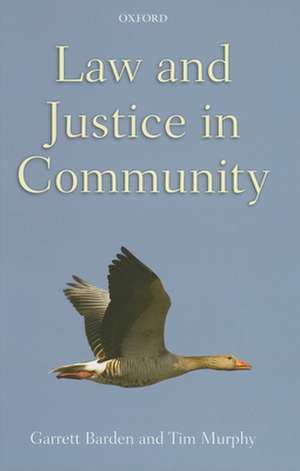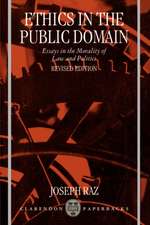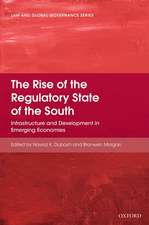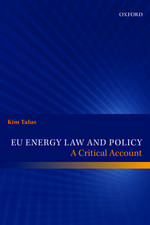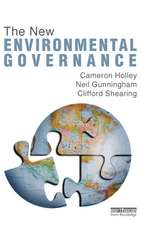Law and Justice in Community
Autor Garrett Barden, Tim Murphyen Limba Engleză Hardback – 18 aug 2010
Preț: 791.69 lei
Preț vechi: 965.48 lei
-18% Nou
Puncte Express: 1188
Preț estimativ în valută:
151.49€ • 158.57$ • 126.09£
151.49€ • 158.57$ • 126.09£
Carte tipărită la comandă
Livrare economică 31 martie-14 aprilie
Preluare comenzi: 021 569.72.76
Specificații
ISBN-13: 9780199592685
ISBN-10: 0199592683
Pagini: 304
Dimensiuni: 163 x 241 x 23 mm
Greutate: 0.61 kg
Editura: OUP OXFORD
Colecția OUP Oxford
Locul publicării:Oxford, United Kingdom
ISBN-10: 0199592683
Pagini: 304
Dimensiuni: 163 x 241 x 23 mm
Greutate: 0.61 kg
Editura: OUP OXFORD
Colecția OUP Oxford
Locul publicării:Oxford, United Kingdom
Recenzii
`The scope of content, the depth of research, and the comprehensive way in which the material is presented are to be commended. It certainly makes an important contribution to jurisprudence. But it is of wider interest, and the issues dealt with here are of concern to all people intent on living 'the good life'. Students and scholars from, in particular, law, philosophy, theology and political science will find this a helpful, challenging and informative read.'Suzanne Mulligan, Irish Theological Quarterly
`Overall, this is an ingenious and original book.'Jonathan Crowe, Ethics
`...a novel and signal contribution to jurisprudence. It addresses perennial concerns, such as the nature of law, obligation, authority, legitimacy, morality, and the natural law...Law and Justice in Community lies in a different intellectual tradition. It draws principally on the ideas of Aristotle and Aquinas, combined with an account of justice honed through a consideration of Roman law...Law and Justice in Community will enlighten and provoke in equal measure. For that, the authors are to be both thanked and applauded.'Oran Doyle. The Irish Jurist
`A thought- provoking book which sets out, on its own terms, to make an unconventional contribution to the debate about the nature of law. It is a pleasure to read an elaborate argument which the authors try to develop with care from their initial premises, controversial though these may be. This is a provocative and imaginative work that deserves to be read and pondered by anyone with an interest in theortetical inquiries about law.'Roger Cotterrell, International Journal of Law in Context
`While one of its manifest virtues is its careful scholarly precision, [Law and Justice in Community] manages to combine this with a comprehensive approach that is both exciting and persuasive. . If one were looking for sources for this approach, one would perhaps not be wrong in selecting the antecedently unlikely quartet of Hobbes, Aristotle, Hayek and Aquinas as being pre-eminent among those who inspire Professors Barden and Murphy. In the end, however, whatever they may have taken over from previous thinkers, or perhaps because of what has been taken, the authors' approach to their topic, without straining for novelty for novelty's sake, is distinctly original. This book should be read by anyone interested in jurisprudence or the philosophy of law and would provide valuable material to students of anthropology, history, sociology and political science.'Gerard Casey. International Journal of Philosophical Studies
`It is very informative to see the Aristotelian way of analyzing political and jurisprudential problems working from different premises than is ordinarily done. This book is both radical and traditional and it is splendidly argued. It deserves to be widely read and to be influential.'Gudmundur Heidar Frimansson, Nordicum-Mediterraneum
`The authors draw from disparate sources, historic and geographic, for conceptual inspiration and example. The authors' reliance on the Greeks and Romans and the work of Thomas Aquinas, and their resulting global approach to the theory of law, counterbalances the specificity of school into which jurisprudential enquiry has migrated. The authors do not proceed from an overly rigorous process of definition and methodology but from a common sense and learned approach drawn from their independent, clear-thinking reflection. As a consequence, those who do not agree with everything in the book will find much of value so far as the authors' intuitive analyses elucidate, correspond with, and broaden their own experience and views.'Diarmuid Rossa Phelan, Dublin University Law Journal
`Overall, this is an ingenious and original book.'Jonathan Crowe, Ethics
`...a novel and signal contribution to jurisprudence. It addresses perennial concerns, such as the nature of law, obligation, authority, legitimacy, morality, and the natural law...Law and Justice in Community lies in a different intellectual tradition. It draws principally on the ideas of Aristotle and Aquinas, combined with an account of justice honed through a consideration of Roman law...Law and Justice in Community will enlighten and provoke in equal measure. For that, the authors are to be both thanked and applauded.'Oran Doyle. The Irish Jurist
`A thought- provoking book which sets out, on its own terms, to make an unconventional contribution to the debate about the nature of law. It is a pleasure to read an elaborate argument which the authors try to develop with care from their initial premises, controversial though these may be. This is a provocative and imaginative work that deserves to be read and pondered by anyone with an interest in theortetical inquiries about law.'Roger Cotterrell, International Journal of Law in Context
`While one of its manifest virtues is its careful scholarly precision, [Law and Justice in Community] manages to combine this with a comprehensive approach that is both exciting and persuasive. . If one were looking for sources for this approach, one would perhaps not be wrong in selecting the antecedently unlikely quartet of Hobbes, Aristotle, Hayek and Aquinas as being pre-eminent among those who inspire Professors Barden and Murphy. In the end, however, whatever they may have taken over from previous thinkers, or perhaps because of what has been taken, the authors' approach to their topic, without straining for novelty for novelty's sake, is distinctly original. This book should be read by anyone interested in jurisprudence or the philosophy of law and would provide valuable material to students of anthropology, history, sociology and political science.'Gerard Casey. International Journal of Philosophical Studies
`It is very informative to see the Aristotelian way of analyzing political and jurisprudential problems working from different premises than is ordinarily done. This book is both radical and traditional and it is splendidly argued. It deserves to be widely read and to be influential.'Gudmundur Heidar Frimansson, Nordicum-Mediterraneum
`The authors draw from disparate sources, historic and geographic, for conceptual inspiration and example. The authors' reliance on the Greeks and Romans and the work of Thomas Aquinas, and their resulting global approach to the theory of law, counterbalances the specificity of school into which jurisprudential enquiry has migrated. The authors do not proceed from an overly rigorous process of definition and methodology but from a common sense and learned approach drawn from their independent, clear-thinking reflection. As a consequence, those who do not agree with everything in the book will find much of value so far as the authors' intuitive analyses elucidate, correspond with, and broaden their own experience and views.'Diarmuid Rossa Phelan, Dublin University Law Journal
Notă biografică
Garrett Barden is Emeritus Professor of Philosophy at University College Cork in Ireland. He received his university education at Dublin, Louvain, Heythrop and Exeter College, Oxford. In the early part of his career he carried out anthropological fieldwork in Warburton, Western Australia, and taught philosophy in New York and Dublin. He then worked at the Department of Philosophy in University College Cork from 1972 until his retirement in 1999. During this time he served terms as Assistant Dean and Dean of the Arts Faculty of University College Cork. During his career he has been on several occasions a Visiting Professor (in Rennes, France; Nitra and Bratislava in Slovakia; and Reykjavík, Iceland) and he is now a Visiting Professor of Law at the University of Akureyri in Iceland.Tim Murphy is Visiting Professor of Law at the University of North Malaysia. He received his university education at Cork, Warwick and Maynooth. He previously held law faculty positions at the University of Sheffield (1989-1991), the University of Nancy II (1991-1992), University College Cork (1992-2005), and the University of Akureyri, Iceland. In 1995 he was a Visiting Lecturer in Law at the National Law School in Bangalore, India.
